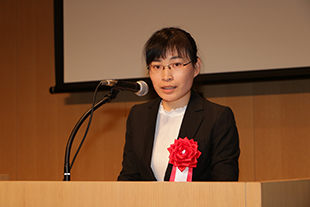 The 18th Asia Pacific Research Prize (Iue Prize) winner: Dr. Huang Jie
The 18th Asia Pacific Research Prize (Iue Prize) winner: Dr. Huang Jie
Title of Dissertation: “A Folkloric Study on ‘Senl’: Analysis of the Regional Social System of River Basins among the Dong (Kam) in Southern China”

- Dr. Huang Jie
-
- Career -
Huang Jie is a Project Researcher of the Graduate School of Asian and African Area Studies, Kyoto University from April 2019, who just finished her doctoral study and received a Doctor of Area Studies degree from the same department in March 2019. She received her Bachelor of Arts degree from Jinan University, China in 2010 and Master of Laws degree from the Graduate School of Arts at Guangxi Normal University, China in 2014. Afterward, she came to pursue a Ph.D. in Japan in 2015 as a research student at Kyoto University. During her doctoral studies, she also received the Asahi Glass Foundation Scholarship for international students in 2017-2018.
- Summary -
This thesis is an ethnography reveals the social system of the local community among Dong nationality (Kam), who is one of the Tai-speaking groups resident in Southern China.Previous researches on the history and society of Dong nationality from the perspective of ethnic minority studies in China have made great efforts to restore the history process of Dong’s maintenance and reconstruction after 1950s as a unit nationality, by adopting the historical material written in Chinese or models of Han-Chinese Studies.
Moreover, previous studies on Dong society from the Southeast Asia Areas Studies tended to focus on the fact that Dong has been greatly influenced over a long period of time by the Han-Chinese culture in order to compare it with the other ethnic groups of Tai group, such as the Dai in Xishuangbanna. However, on the other hand, Dong people also share some same cultural pattern of other Tai-speaking group. For instance, their kinships or local communities are usually named after the places where they live (e.g. rivers or mountains), or their migration and immigration history. In addition, river system is an important factor of Dong society since political, economy, language, folklore of local communities varies from river to river.
Therefore, the purpose of this thesis is to reconsider the history and society of Dong nationality from the viewpoint of their own folklore concept of “Senl”, which represents a specific social system of Dong nationality based on the river basin, by observing the kinship, village organization, intermarriage, worship of ancestors and leadership within a local community.
Through the whole discussion three points were clarified as followed. Firstly, as a nationality without their own written system, Dong people use Han-Chinese as scripts and express their culture of kinship by adopting the Han-Chinese language and the model of Chinese clan. While, Dong people also represent their own traditional model or rules of kinship with Dong language, which shows the large difference and the dynamics between Chinese clan and Dong's kinship. Secondly, Dong people usually carry out genealogical manipulation, that consequently makes their local community seem to be maintained as kinship. Finally, the most important function of Dong’s leaders within a village or a river system is to perform the ritual of guardian spirits on each level. This bond of faith presents that, the political system of Dong, thought they are non-Buddhism, is closed to other Tai ethnic groups than their Chinese neighbors.






